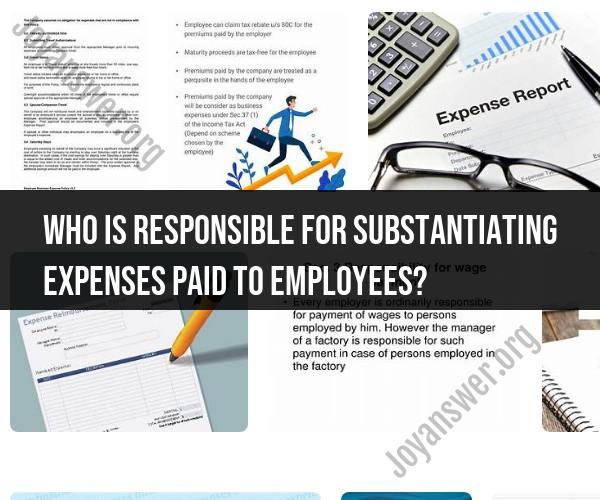Who is responsible for substantiating expenses paid to employees?
The responsibility for substantiating expenses paid to employees typically falls on both the employer and the employee, and it is essential for compliance with tax and financial regulations. Here's a breakdown of the responsibilities:
1. Employer Responsibilities:
Policy Creation: Employers are responsible for creating clear and comprehensive expense reimbursement policies. These policies should outline what expenses are eligible for reimbursement, the submission process, and any documentation requirements.
Review and Approval: Employers or designated managers are responsible for reviewing and approving employee expense reports. They should ensure that expenses align with company policies and are reasonable and necessary for business purposes.
Documentation Verification: Employers should verify that employees provide adequate documentation for their expenses. This may include receipts, invoices, travel itineraries, and other relevant records.
Compliance: Employers must ensure that their expense reimbursement processes comply with tax regulations, labor laws, and accounting standards. Failure to comply with these regulations can result in financial penalties.
Timely Reimbursement: Employers are responsible for reimbursing employees for approved expenses promptly, usually within a specified time frame outlined in the company's policy or local labor laws.
2. Employee Responsibilities:
Expense Tracking: Employees are responsible for accurately tracking and documenting their expenses. This includes collecting and retaining receipts, invoices, and other supporting documents.
Expense Report Submission: Employees must submit their expense reports in a timely manner, following the company's established process. This typically involves detailing the expenses and providing supporting documentation.
Compliance: Employees should ensure that their expense claims adhere to the company's policies and any relevant tax laws. Inaccurate or fraudulent expense claims can lead to disciplinary actions or legal consequences.
Communication: Employees should communicate with their employers or finance department if they have questions or need clarification on the expense reimbursement process.
Cooperation: If requested, employees should cooperate with audits or reviews of their expenses to ensure compliance and accuracy.
Both employers and employees play crucial roles in substantiating expenses paid to employees. Transparency, clear policies, and open communication are key to ensuring compliance and smooth reimbursement processes. Compliance with tax laws is especially important to avoid potential legal issues and financial penalties. It's advisable for employers and employees to work together to establish and maintain effective expense management practices.
Substantiating Employee Expenses: Responsibility and Guidelines
Employees are responsible for substantiating their business expenses to their employer. This means that they must provide documentation to support their claims. The documentation should include the following information:
- Date of the expense
- Amount of the expense
- Purpose of the expense
- Place of the expense
- Business connection of the expense
The employer may also require additional documentation, such as receipts, invoices, or mileage logs.
Guidelines for substantiating employee expenses:
- Keep all receipts and other documentation for business expenses.
- Submit expense reports to your employer promptly.
- Be prepared to explain any unusual expenses.
Validating Employee Payments: Who Bears the Responsibility?
The employer is responsible for validating employee payments. This means that the employer must ensure that the payments are accurate and that they are being made for legitimate business expenses.
Employers can validate employee payments by:
- Reviewing expense reports carefully.
- Comparing expense reports to receipts and other documentation.
- Conducting spot audits.
Expense Verification: Ensuring Accuracy in Employee Payments
There are a number of ways to ensure accuracy in employee payments. Some of the most common methods include:
- Using an expense management system: An expense management system can help employers to automate the expense reimbursement process and to identify any potential errors.
- Requiring employees to submit receipts and other documentation for all expenses: This will help to ensure that the expenses are legitimate and that they are being reimbursed accurately.
- Conducting spot audits: Spot audits can help to identify any employees who are submitting fraudulent expense reports.
By taking these steps, employers can ensure that employee payments are accurate and that they are being made for legitimate business expenses.
Additional tips for substantiating, validating, and verifying employee expenses:
- Use a standard expense report form: This will make it easier for employees to submit their expenses accurately and for employers to review them.
- Provide clear guidance on what expenses are reimbursable: This will help to avoid any disputes between employees and employers.
- Set deadlines for submitting expense reports: This will help to ensure that expense reports are processed promptly.
- Have a process in place for resolving disputes: This will help to ensure that any disputes are resolved quickly and fairly.
By following these tips, employers can create a system for substantiating, validating, and verifying employee expenses that is both efficient and effective.












